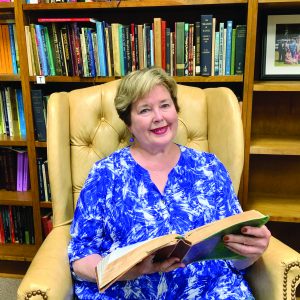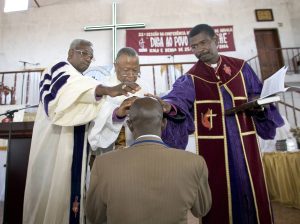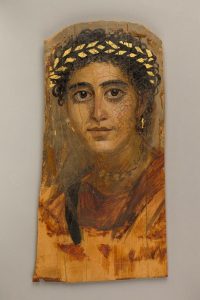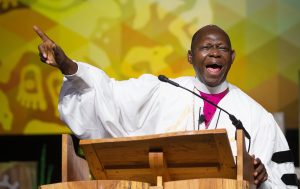
by Steve | Sep 14, 2020 | Magazine, Magazine Articles, Sept-Oct 2020
By Courtney Lott –

The Rev. B.J. Funk.
Do you hear the song of grace in your life? For the Rev. B.J. Funk, Associate Pastor at Central United Methodist Church in Fitzgerald, Georgia, its sweet melody has played throughout her entire life, calling to her like a well-intentioned siren until finally drawing her into the loving arms of God. This tune is so familiar to her that she hardly realized others did not recognize it as well until a friend asked her to write a book on the assurance of God’s love.
Saddened that others live in this precarious position, B.J. set out to help others better hear the song of grace, better see the dance of love. This book, It’s a Good Day for Grace, is dedicated to her mother, a woman who exuded a grace so compelling, she says, that those around her could not miss it.
As a devotional writer – she has been a beloved columnist for Good News since 2009 – her “prayer is that you will come to understand the unimaginable, and individual love” God has for each of us. “I want you to sense the spotlight of God’s love and grace as he shines into the hidden areas of your life,” Funk writes in the introduction. “In those places, he will dig out the debris and hurts you have known and show you that you are his beloved, created in his own image. He has all the time in the world for you.”
These short devotionals – most barely a page long – are rich with words of encouragement and assurance, a balm for the soul. The theme of grace personified as a gentle teacher continues throughout. Like a kind mother, grace holds our hands, guides us through difficult times, redirects us to our loving Heavenly Father.
Broken up thematically by month, Funk draws our attention to different aspects of grace. At the end of each individual devotion, she also utilizes a kind of liturgical repetition to tune us to grace’s ever-present rhythm.
As a writer, her use of strict meaning and creative metaphor is gracious in and of itself, forming a beautiful picture of deep theological concepts accessible for a variety of readers. Wise as ever, she defines her terms, never making assumptions about her audience. “Grace,” she writes, “is the undeserved, unmerited, unconditional love of God.” Yet even in these places, she does not abandon helpful metaphor. “[Grace] reaches through our desperate attempts at happiness and lays a bouquet of hope at our feet.”
Equally wise are her calls to action throughout the book. As she draws to a close on December 31, B.J. writes,” Decide that in this upcoming New Year, you will seek to notice [God] more, to bring him into your plans. He has always brought you into his.”
It’s a Good Day for Grace is a respite in our current times. It provides a place to rest, to marinate in the beauty of this truth. We encourage you to take a moment with this book. Within its pages, you will find encouragement for your souls, and maybe even a little assurance.
Courtney Lott is editorial assistant at Good News. It’s a Good Day for Grace can be ordered through Amazon, Westbow, and Barnes & Noble.
![Between Making Hay and the Dark Night of the Soul]()
by Steve | Sep 14, 2020 | Magazine, Magazine Articles, Sept-Oct 2020
By Elizabeth Glass Turner

Photo by Johannes Plenio from Pexels.
When things were normal, Summer was a season for seeing people we normally didn’t get to visit much: family reunions in park pavilions or vacation at a camp where we see people we only see once a year.
In a spiritual sense, a similar experience takes place when we explore the dynamic works of Christian men and women from bygone eras and different traditions. Sometimes when the flowering tree is in bloom and the breeze moves slowly under the weight of humidity, we bump into spiritual relatives we don’t see very often.
Imagine a park pavilion with nervous, eager smiles from ecumenical brothers and sisters throughout the ages carrying potato salad and fried chicken for an afternoon’s visit at a family reunion – so to speak. While we arrive with notable and important differences, we have so much to learn and share around the table of Christian faith.
One person around my table would be Ignatius (1491-1556). Sometimes you bump into a distant relative and wonder how you’ve never connected before. Ignatius is that guy. Assuming you have Google, much can be learned about his contributions to Christian thought at a later time. Here, I’d like to briefly sketch an appreciative note on his concepts of consolation and desolation – phrases that might not be commonly used, but they reflect universal experiences common to all believers.
Ignatius defines consolation as “when some interior movement in the soul is caused, through which the soul comes to be inflamed with love of its Creator and Lord.” At the opposite end of the spectrum, he defines desolation as the soul being disturbed and agitated, “without hope, without love, when one finds oneself all lazy, tepid, sad, and as if separated from his Creator and Lord.”
Some wisdom is deep and hard and rich but at the same time feels like good old-fashioned common sense. Ignatius offers that kind of wisdom. It cuts against the #blessed trend, it cuts against cynical pessimism, and it cuts against the insidious assumption that anything we experience in our life must result from our own smarts or stupidity, holiness or hollowness. It is deeply personal without being damningly individualistic.
For Ignatius, the seasons of consolation and desolation are part of the normal paths of the Christian life. There will be times of consolation – when there is a sense of noticeable, personally experienced growth or blossoming, when God’s presence seems close and the means of grace seem easy and quick at hand.
Unsurprisingly, there will also be times of desolation – similar to the “dark night of the soul” – when, whether from wrongdoing, or attacks of the enemy, or times of struggle or challenge, God’s presence seems distant or even simply absent, when our growth seems stalled or the habits that sustain us feel unusually heavy.
Ignatius counsels that in a time of consolation, followers of Christ should practice gratitude; resist self-satisfied pride, by remembering how limited we were during seasons of desolation; capitalize on the presence or abundance of energy available; and determine not to back out on the resolutions we’re making while things are going well, when later they do not. If he had been a midwestern farmer, consolation might be described in part as, “make hay while the sun shines.”
Ignatius also counsels that in a time of desolation, followers of Christ should practice the habit of recalling God’s faithfulness in prior times of desolation; resist the temptation to see suffering as pointless; resist desolation through meditation and prayer; avoid making big decisions; pay attention to the spiritual insights found during desolation; and confidently look for the quick return of a season of consolation.
If Ignatius had been a leader in Great Britain in World War II, desolation might be described in part as, “We shall go on to the end. We shall fight in France, we shall fight on the seas and oceans, we shall fight with growing confidence and growing strength in the air, we shall defend our island, whatever the cost may be. We shall fight on the beaches, we shall fight on the landing grounds, we shall fight in the fields and in the streets, we shall fight in the hills; we shall never surrender…”
Yet Ignatius manages to avoid painting seasons of consolation and desolation as solely discerned by individualistic feelings, and gives wise counsel for how to discern when a choice, circumstance, or perspective moves us toward God and others, and when a choice, circumstance, or perspective is moving us away from God and others.
Overall, for Ignatius, Christians shouldn’t be surprised when desolation gives way to consolation, and we shouldn’t be surprised when consolation again gives way to a period of desolation; but, whether we perceive it or not at the time, God can use both to form and fashion our character and our loves, and the more prepared we are to encounter either season, the better we will endure the challenges that come with both abundance and affliction.
This old wisdom certainly has relevance for the constant question, “why do bad things happen to good people?” It has relevance for someone you know in your life who is going through something awful that you can’t understand.
Good things come to those who ….
To those who what? To those who wait.
“Wait,” Ignatius murmurs over a paper plate of fried chicken on a hot summer afternoon at the ecumenical family reunion. “Your time of consolation will give way – so store up now. Your time of desolation will resolve – so resist at every turn.” (Good things come to family reunions, too.)
Sometimes, if you’re tired, finding an old relative (or a dead one) will give you some new perspective. Whether you’re in a season of consolation or desolation – thank God for Ignatius.
Elizabeth Glass Turner is the managing editor of Wesleyan Accent (wesleyanaccent.com). This article first appeared at Wesleyan Accent and is reprinted here by permission.

by Steve | Sep 14, 2020 | Magazine, Magazine Articles, Sept-Oct 2020
By David Watson –

Bishops of the United Methodist Church in Angola lay hands on a new pastor during a 2006 ordination service at the West Angola Annual Conference session at the Icolo e Bengo United Methodist Church in Luanda. Photo: Mike DuBose, UMNS.
The Wesleyan Covenant Association has released a series of articles on new paragraphs for inclusion in its draft “Book of Doctrines and Discipline.” In the first article on these sections, the Rev. Dr. David F. Watson addresses the theological foundations for ordination in a new expression of Methodism. On the following pages, the Rev. Dr. Suzanne Nicholson writes on the WCA’s proposals for deacons, and Pastor Matt Abel rounds out the series by exploring the WCA’s recommendations for the service of licensed local pastors.
A new, traditional expression of Methodism is forming. We have before us tremendous opportunities and challenges, and we face both in our conversations regarding ordination. One of my concerns about ordination in The United Methodist Church has been that we have too often allowed pragmatism, rather than clear theological principles, to shape our language and practices around ordination. We have had serious disputes over ordination without a clear sense of what ordination is.
As the Wesleyan Covenant Association has approached questions around ordination for a new expression of Methodism, it has tried to ground its work in the principles of theological integrity, biblical fidelity, simplicity, and clarity. In what follows I will provide a brief overview of the WCA’s proposals regarding ordination and their theological underpinnings.
All Christians are called by God to ministry in one form or another. First Peter speaks to the church about its core identity: “You are a chosen people, a royal priesthood, a holy nation, God’s special possession, that you may declare the praises of him who called you out of darkness into his wonderful light” (1 Peter 2:9 NRSV). Protestants have long affirmed the “priesthood of all believers.” Each of us can “approach God’s throne of grace with confidence, so that we may receive mercy and find grace to help us in our time of need” (Hebrews 4:16). Put differently, all Christians are comprised within the ministry of the laity. The term “laity” comes from the Greek word laos, which means “people.” The laity are the people of God who have been called out from the world into the church through the sacrament of baptism. Through the laity most of the church’s ministerial work takes place.
From among the laity, some people are called to particular sacred vocations. Those who say yes to this calling, and whom the church affirms in their calling, become the clergy. The term “clergy” is derived from the Greek word kleros, which means “portion,” among other things. A certain portion of the laity are chosen for special service, some as deacons, some as elders. By the laying on of hands, we demonstrate the church’s recognition of them as so called, designate them as having been set apart for such service, and pray God’s empowerment of their ministry. It’s important to clarify here that clergy remain laity. Not all laity are clergy, but all clergy are laity. They are people of God called to an order of ministry within the community of baptized Christians.
The primary call of all clergy is to service in the Church. We call these “deacons.” The Greek word diakanos, from which we derive “deacon,” simply means “servant.” The Bible teaches us about deacons in a number of places. One might say that the first deacons were the seven who are chosen to serve in Acts 6. The seven are called specifically to serve (diakonein) at tables, or, in other words, to help with the distribution of food. The apostles lay hands on them and pray for them in order to set them apart for this service. First Timothy 3:8-13 describes the qualifications for deacons. Deacons are mentioned alongside bishops in Philippians 1:1, and Paul mentions a deacon named Phoebe in Romans 16:1.

Like nested dolls, elders do not cease to be deacons. Rather, they are always both laity and deacons, but they also have additional responsibilities and duties. Photo: Good News Media.
The ministries of deacons can take many different forms. Some are called to teach. Others are called into specific ministries with the poor. Some are called to administration. As a church, we should recognize these callings, affirm them, and pray God’s empowerment of them. When the bishop lays hands on a deacon, it is the church’s “yes” to God’s calling of a Christian into the ministry of service, and the church’s prayer that God will empower and bless the one called. He or she is thus received into an order, or, as we say, ordained. An ordained Christian may spend his or her entire vocation serving as a deacon.
Some deacons, however, may be called into a ministry of overseeing word, sacrament, and order for the Church. In these circumstances, we say that they are called into an additional order, the order of elders (Greek: presbyteroi). They do not stop being deacons when they are ordained as elders, but they take on additional specific responsibilities. Titus 1:5-9 describes qualifications for elders and bishops (who are drawn from among the elders). In Acts 20:17-34, Paul gathers the elders in Ephesus for a farewell speech, admonishing them to act as faithful shepherds over those entrusted to them, and in particular to guard against “wolves” in their midst who will distort the truth. First Timothy 5:17 refers to elders as those who preside over the affairs of the church. First Peter 5:1-4 offers this excellent advice: “I exhort the elders among you to tend the flock of God that is in your charge, exercising the oversight, not under compulsion but willingly, as God would have you do it – not for sordid gain but eagerly. Do not lord it over those in your charge, but be examples to the flock. And when the chief shepherd appears, you will win the crown of glory that never fades away.”
Elders do not cease to be deacons. Rather, they are always both laity and deacons, but they also have additional responsibilities and duties. Put briefly, elders proclaim and preside. They are called to proclaim the word of God through faithful preaching and teaching. They are called to preside over the church’s sacramental ministry and consecrate the elements during holy communion. They are also called to preside in matters related to church order.
In these proposals for ordination in a new Methodist movement, oversight of the sacraments is reserved for elders. Deacons may have sacramental authority in some circumstances, but only with the approval of a bishop and under the oversight of a presiding elder. Why is this the case? The reason is not that elders are somehow better than laity or deacons. It is that they are called to preside in the life of the church, and there is no more significant event at which to preside than in the administration of the sacraments. As Methodists, we believe that baptism is not just an initiation ritual, but a channel of the Holy Spirit’s power. We believe that Holy Communion is not just a remembrance, but a means by which we truly receive the body of and blood of Christ by faith. Baptism and communion are both ordinances – practices commanded by Christ – and sacraments – reliable means by which we receive the transforming grace of God. Those charged with presiding over these means of grace are (hopefully) educated in a way that allows them to understand the sacraments theologically and administer them properly. They are examined by the church for both calling to and fitness for sacramental oversight, and subsequently ordained by the church to preside. It is no light matter to oversee sacramental practice, which is why we locate authority for such within a group of clergy called and prepared to do so.
In summary, the orders of the church should relate to one another like nested dolls (to use a metaphor from my friend Scott Kisker). Every Christian stands within the order of laity. Every deacon remains within the laity, even as he or she takes on special responsibilities in the life of the church in obedience to the call of God. Likewise, elders are called to even more specific ecclesiastical responsibilities, but they remain both deacons and laity. Ministry is not simply for a select few. It is for everyone. Clarity about our orders, responsibilities, and duties will help us to live faithfully in this new expression of Methodism.
David F. Watson is Academic Dean and Vice President for Academic Affairs and Professor of New Testament at United Theological Seminary in Dayton, Ohio. He is also a member of the Wesleyan Covenant Association Council. Dr. Watson is one of the hosts of “Plain Truth: A Holy-Spirited Podcast” and the lead editor for Firebrand (firebrandmag.com).

by Steve | Sep 14, 2020 | Magazine, Magazine Articles, Sept-Oct 2020
By Suzanne Nicholson –

In the early church, Phoebe served as a deacon in the church at Cenchrea, a city near Corinth. The above portrait is of a young woman during A.D. 90–120. Metropolitan Museum of Modern Art.
What follows is a discussion on new paragraphs the Wesleyan Covenant Association is releasing for inclusion in its draft “Book of Doctrines and Discipline” regarding the proposal for the ministry of deacons.
In this season of rapid change and uncertainty, it may be unsettling and difficult to embrace a new structure for clergy orders. But deacons, who often have felt misunderstood and overlooked, can embrace a new vision that provides a stable foundation for their very important ministries.
This vision for a new Methodist denomination takes seriously the call for all believers to join in ministry, sharing the love of Christ and making disciples of all nations. Yet some of these believers are called by God from the laity, set apart for particular service to the Church. When the Church recognizes this calling and ordains deacons through the laying on of hands, these servants are empowered to share Christ in numerous ways both in local churches and the world beyond.
Deacons have a remarkable history of service in diverse ministry settings. Some serve in the local church, assisting elders with the sacraments, teaching and preaching, and providing pastoral care. Others work outside the church in compassion and justice ministries, working with the homeless, serving in food pantries, helping those suffering from addiction, and advocating for the voiceless in society. Still others teach in Christian colleges and seminaries, serve as hospital or military chaplains, or work in other professions too numerous to describe here. In a new traditionalist Methodist church, the Wesleyan Covenant Association believes deacons should continue serving in these vital ministries, and they could remain as deacons indefinitely. As ordained clergy, they would continue to have authority to perform marriages and funerals (see para 502.1 of the draft “Book of Doctrines and Discipline”).
In The United Methodist Church, some deacons have expressed a desire for sacramental authority in their ministry settings. Currently, such authority can be granted by a bishop in special circumstances. Under the provisions envisioned for a new church, the WCA proposes allowing a bishop to grant this authority to a deacon serving as a pastor in a local church, or to a deacon in any specialized ministry setting where the sacraments are required. This language recognizes the fact that the sacraments must, at times, be offered outside of the local church – in places like hospitals, nursing homes, or military bases (see para 508).
According to the UM Church, deacons and elders are separate and distinct, like branches on a tree stretching out in different directions. It seems odd to suggest that deacons are called to Word, Service, Compassion, and Justice, but elders are called to Word, Service, Sacrament, and Order. Are not elders also called, by their very nature as believers, to offer compassion and justice to those in need? And deacons are described as serving in the world and building a bridge back to the church, whereas elders serve by ordering the local congregation. Are not elders also, by their very nature as believers, called to proclaim the name of Christ in the world, bringing the Gospel to the lost?
The WCA, in its draft “Book of Doctrines and Discipline,” suggests a new Methodist church understand elders as called out from the deacons to provide the specific ministry of Word, Sacrament, and Order in the church. Elders would retain their calling as laity and deacons even as they participate in the Order of Elders. This vision of nested ministries, in which each order is called out from the previous one, portrays the interconnectedness of laity, deacons, and elders in a way the UM Church does not. According to the proposed WCA system, these orders would not branch out in different directions. Rather, the specialized ministry of elders would flow out of the specialized ministry of deacons, which would flow from the ministry of all laity, which is grounded in Christ. This linear extension of the body of Christ emphasizes the unified calling of all believers, even as some are set apart for specific ministries.
In the early church, Phoebe served as a deacon in the church at Cenchrea, a city near Corinth. She had helped Paul in his work, and he described her as a “benefactor of many people, including me.” He was so confident of her abilities that he designated her to carry his letter to the Roman churches. In that entrusted position, she would have answered any questions that arose when the Roman believers heard the letter read. In other words, she was entrusted to interpret Paul’s words to the church. Phoebe provides an example of how deacons have performed important roles in the Church since its beginning. In the current time of change and uncertainty, the WCA believes the ministry of the deacon should be retained and celebrated. It believes a new Methodist church should continue to promote and honor the work of those women and men called to serve in the role of deacon.
Suzanne Nicholson is a deacon in the East Ohio Annual Conference and serves as Professor of New Testament at Asbury University in Wilmore, Kentucky. Dr. Nicholson is also a member of the Wesleyan Covenant Association Council and the Assistant Lead Editor for Firebrand magazine.

by Steve | Sep 14, 2020 | Magazine, Magazine Articles, Sept-Oct 2020

Photo by Steve Beard.
By Matthew Abel –
What follows is a discussion on new paragraphs the Wesleyan Covenant Association is releasing for inclusion in its draft “Book of Doctrines and Discipline” regarding the proposal for the service of licensed local pastors.
Average worship attendance at local United Methodist churches in the United States has declined by 30 percent since the turn of the 21st century. And declining attendance often leads to fewer financial resources in local churches. Consequently, more and more local churches find themselves unable to afford the minimum salary and benefits package required to have an ordained elder appointed to their church. Enter licensed local pastors, who do serve for less, but with no less passion for the calling. Annual conferences across the United Methodist connection increasingly depend on these pastors to serve in many of their local churches.
Like elders, licensed local pastors are appointed by bishops and serve under district superintendents, but they serve as appointments are available for them. When they are not under an appointment they serve cheerfully and passionately as laity. When they are appointed to a local church they serve as the pastor-in-charge, and therefore are accorded the privilege of celebrating the sacraments, preaching the word, presiding at weddings and funerals, and maintaining the good order of the local church. They do amazing ministry all across the United Methodist connection.
It is no secret that the Wesleyan Covenant Association includes many people who, over the years, have identified with renewal and reform groups like the Confessing Movement, Good News, and UMAction. At General Conferences, these groups have consistently advocated for extending more rights, responsibilities, and vocational safeguards to licensed local pastors. That passion for more fully recognizing their service and finding ways to include them among the ranks of all clergy has carried over into the WCA.
That being the case, one will not be surprised to read the most recent paragraphs the WCA has added to its draft “Book of Doctrines and Discipline” and note its proposal for integrating licensed local pastors into the Order of Deacons, and providing them with a clear and simplified pathway into the Order of Elders should they choose to take it.
As the Rev. Dr. David Watson explained in a previous article (page 36), the WCA takes a “nested” view of ministry. All persons are called to the order of the laity and all laity are called to ministry. Some laity are called to serve as deacons, and some deacons are called to serve as elders. In order to avoid treating licensed local pastors like an auxiliary form of ministry, the WCA proposes their full integration into the Order of Deacons. This approach is consistent with the WCA’s theological foundations for ministry, treats licensed local pastors as equal partners in ministry, and recognizes the increasingly critical role they will play in the future of a new Methodist church.
Under the WCA’s proposal, the office of the deacon can be a terminal calling. That means some who feel called to service in teaching, a parachurch ministry, or in other unique ministries may find that their place is permanently in the Order of Deacons. However, the WCA proposes that those who are called out from the laity towards pastoral ministry should be incorporated into the Order of Deacons. During their service as an ordained deacon they may serve in a pastoral role while working towards the Order of Elders should they choose to do so.
The WCA envisions a system where anyone who senses a call to pastoral ministry can embark on a path to become a deacon and eventually an elder, however in an effort to avoid treating licensed local pastors as second-class clergy, it proposes including them in the Order of Deacons so at a minimum they have all the responsibilities, rights, and privileges of serving in that order. The WCA believes they should be acknowledged for who they are: called and gifted clergy who are among the ordained in the church.
So while there is no designation “licensed local pastor” in the WCA’s draft “Book of Doctrines and Discipline” this should not be understood as a diminishment of those now serving in this capacity; in fact it is the exact opposite. The WCA believes all those who serve should belong to an order of the ordained and not merely licensed to serve in an auxiliary capacity.
As local licensed pastors decide to transfer to a new traditionalist Methodist church, the WCA proposes that after proper vetting (vetting that will apply to all clergy seeking to transfer), they be received into the Order of Deacons. The WCA believes they, like other clergy, should be encouraged to take advantage of continuing educational opportunities, and consider a formal course of study should they sense a call to serve as an ordained elder.
As I finish my fifth year of ministry as a licensed local pastor, I am excited about the prospects for a new Methodist church. I look forward to the day when all ministers of the Gospel in our connection are welcomed and honored as persons called to share the good news of Jesus Christ with a hurting world.
Matthew Abel is a licensed local pastor serving as the Associate Pastor and Youth Minister at Florence United Methodist Church in Florence, Kentucky. As he serves in a local church, he is also pursuing a Masters of Divinity degree at Asbury Theological Seminary in Wilmore, Kentucky. Matthew is also a member of the WCA’s Global Council.

by Steve | Sep 14, 2020 | Magazine, Magazine Articles, Sept-Oct 2020

Bishop John Yambasu gives the sermon during morning worship May 19 at the 2016 United Methodist General Conference in Portland, Oregon. Photo by Mike DuBose, UMNS.
With the rest of the United Methodist family around the globe, we join in mourning the death of Bishop John K. Yambasu, the Resident Bishop of the Sierra Leone Area, who died in a car accident outside Freetown in Sierra Leone on Sunday, August 16. According to the press statement issued from the Council of Bishops, he was on his way to attend a funeral service.
“Bishop Yambasu’s untimely death is stunning news to The United Methodist Church. Bishop Yambasu’s undeniable love and passion for the church has been evident in his area and throughout The United Methodist Church,” said Council of Bishops President Bishop Cynthia Fierro Harvey, who also noted that her heart aches for Bishop Yambasu’s family.
“Our hearts are broken, and we’re devastated by this sudden departure of Bishop Yambasu. This is a great blow to the people called United Methodists! It is our hope and prayer that God will comfort the family in particular and The United Methodist family at large. May his soul rest in perfect peace,” said Bishop Samuel Quire of the Liberia Episcopal Area.
Through his ministry, Bishop Yambasu helped assemble the various United Methodist advocacy groups that proposed an agreement for the separation of the United Methodist Church. “Bishop Yambasu blessed The United Methodist Church with his faith and leadership,” said the Rev. Keith Boyette, president of the Wesleyan Covenant Association and one of the principal participants in the separation agreement. “He was the catalyst for gathering leaders of the various factions in the UM Church for the talks which produced the Protocol of Reconciliation and Grace through Separation. He was an important voice throughout those discussions.”
Bishop Yambasu was president of the Africa College of Bishops of The United Methodist Church and the newly elected Chancellor of Africa University. He was elected a bishop of The United Methodist Church in 2008 and installed in 2009. He was 63 years old. Bishop Yambasu is survived by his wife, Millicent, and their five children – Rebecca, Adima, John, Emmanuel, and Elizabeth.
– Good News








